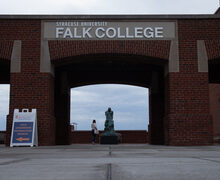‘The bare minimum’: Activists say SPD residency requirements aren’t enough
Wiley Chen | Contributing Photographer
The city shaved off about $4 million from the contract — which initially would’ve added $19.5 million to the police budget.
Get the latest Syracuse news delivered right to your inbox.
Subscribe to our newsletter here.
The city of Syracuse and the local police union will move forward with an agreement to impose residency requirements for newly hired officers and increase the Syracuse Police Department’s budget.
The city and the Syracuse Police Benevolent Association reached the agreement in 2019, but the Common Council rejected it due to its cost. The two parties are taking the contract to an arbitration hearing May 25, where city and union representatives will present their case to a third party who will determine the terms of the contract, which will last two years.
The tentative agreement would require new officers to live in the city for at least five years and will increase the police budget by $15 million over four years to include bonus payments for some officers.
The city shaved off about $4 million from the contract — which initially would’ve added $19.5 million to the police budget — but activists and city officials said the terms of the residency requirements aren’t enough, especially since they’re attached to increased pay for police officers.
“They’re giving us the bare, bare minimum,” said Kayla Johnson, a member of RebirthSYR, a local activist group. “If they took a couple more years to get all cops living in the city, I believe people would be ok with that. At least we’ll be getting somewhere.”
Corey Driscoll Dunham, the city’s chief operating officer, led negotiations on the agreement and said it is a good first step in improving the department. More officers living in the city will improve the relationship between officers and the rest of the community, she said.
The bonus payments could incentivize officers to join the department, Dunham said. The proposed payments would go to officers with military experience, higher education or proficiency in a second language, which could keep more officers in the department long term.
The police union declined to comment on the agreement.
“The police department should reflect the community that it serves, and there is something inherent about living in the city of Syracuse that you might not get living elsewhere,” Dunham said. “To understand the dynamics, the organizations, the neighborhoods, the way that they interact with each other, we really want the officers to reflect the community that they serve.”
Activists agreed that the residency requirement is necessary to improve officers’ understanding of the community, but said a five-year living requirement for new hires isn’t nearly enough, especially given the additional money going into the police budget as a result.
“It shocks me, and it amazes me that they don’t have to live here,” Johnson said. “It’s disappointing.”
Shortly after the city and the union announced plans for the agreement, the Syracuse Police Accountability and Reform Coalition sent a letter to Mayor Ben Walsh calling on his administration to renegotiate the terms of the contract.
SPAARC Letter to Mayor Ben Walsh by The Daily Orange on Scribd
SPAARC was one of 14 advocacy groups that presented nine demands last summer to reform SPD as part of the People’s Agenda for Policing. RebirthSYR was formed after the demands were written but has expressed support for them.
“These decisions erase a year’s worth of protest and organizing and eviscerate a year’s worth of collaborative work to imagine and re-imagine a better and safer Syracuse,” SPAARC said in the letter. “Mayor Walsh, we urge you to retract these statements, pause the process and stick to the agreements you made last summer. Now is the time to make it clear where you stand: with the PBA or with the citizens of Syracuse. ”
One of the demands in the People’s Agenda for Policing called on the city to draft a new contract with the police union that includes the other eight demands.
“It’s an ongoing battle, and we’re kind of losing hope. After the George Floyd trial we were like, ‘Wow, things are changing. Wow, everything is going well,’ but every day somebody Black is dying all over the world,” Johnson said. “It’s like we just keep getting so many slaps in the face.”
But Dunham said it is unlikely that the police union would agree to having more police officers move into Syracuse, especially those who are already living outside of the city.
The only reason the city was able to move to an arbitration was because the union agreed to the terms of the contract, she said. If the city went into the hearing with a term they disagreed with, Dunham said there’s little the city could do to come to an agreement.
“It’s a negotiation,” Dunham said. “Would we have loved to have longer terms of residency or maybe change the details around it? Sure. But it’s a negotiation and everybody needs to give a little.”
Common Councilor At-Large Michael Greene, who is running for mayor against Walsh, agreed that it would be difficult to require all officers to live in the city but expressed frustration with the terms of the agreement.
Rather than investing extra money to pay police officers, Greene said more funding should be directed toward community programs that will address generational poverty and inequalities in the city. Even if the residency requirements aren’t included, investing money in other programs is one of the best ways to help the city, he said.
“To have our main investment be in paying police officers more seems like you’re really treating a symptom of the problem rather than the overlying cause,” Greene said. “It’s not clear to me why we would be solving some of these societal issues by paying officers an extra 10%.”
The arbitration will only cover two years, Dunham said. Once the contract is up, the city will go back to the table with the union to negotiate the contract again. The current agreement provides a foundation to reform the department incrementally, she said.
“The contract is not a silver bullet that’s going to resolve all the challenges we have in terms of policing,” Dunham said. “It’s not the only thing we can do to change relationships. It’s one tool.”
Activists and city officials said that rather than going through with the arbitration, the city should be doing more to include the community in making decisions about police reform.
It’s an ongoing battle and we’re kind of losing hopeKayla Johnson, member of RebirthSYR
Greene said the city should reform Syracuse’s Citizens Review Board to give community members more power in decision-making. He also proposed a civilian commissioner of public safety that would focus on changing policies in the department and improve its relationship with the community.
“There’s definitely a need for a lot of reform within the department, and I don’t think you’ve seen a willingness to do that as quickly as we want to see,” Greene said.
Andrew Croom, a member of SPAARC, proposed improving police responses to mental health crises, such as sending mental health professionals to crisis calls rather than police officers.
RebirthSYR recently committed to marching for 40 days to seek justice for Judson Albahm. Police officers from multiple agencies shot and killed Albahm, who was 17, while he was having a mental health crisis.
The agreement hinders any conversations or proposals for reform in policing in the city, Croom said. The city should reevaluate the decision and push for what the community wants rather than deciding for them, he said.
“You have to speak to the people who are out here on the streets every day doing the work,” Johnson said. “That’s the only way you’re going to get effective change.”
Published on May 3, 2021 at 10:24 pm
Contact Maggie: [email protected] | @maggie_hickss





